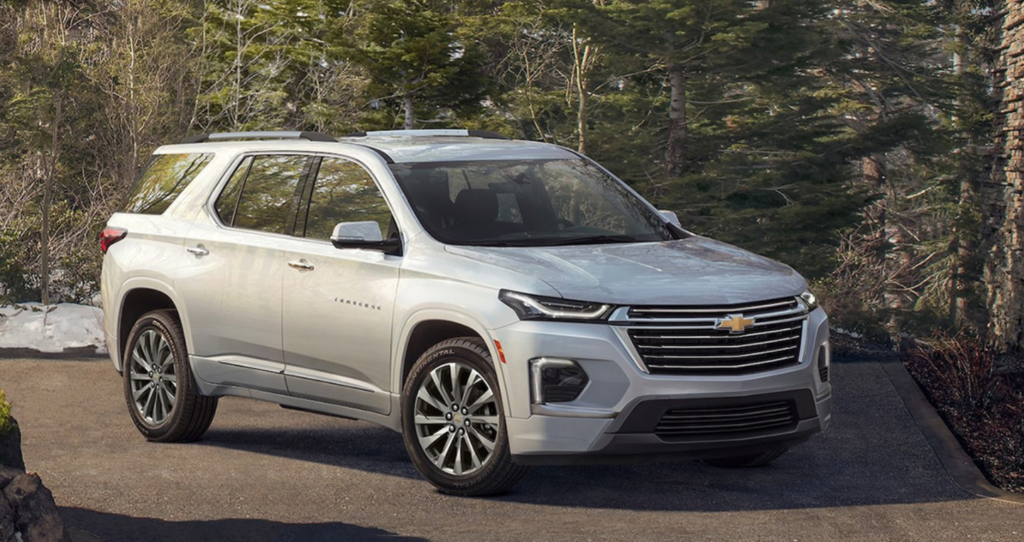Navigating the Road Ahead: A Look at the 2025 Chevrolet Traverse’s Fuel Efficiency
Navigating the Road Ahead: A Look at the 2025 Chevrolet Traverse’s Fuel Efficiency
Introduction
With enthusiasm, let’s navigate through the intriguing topic related to Navigating the Road Ahead: A Look at the 2025 Chevrolet Traverse’s Fuel Efficiency. Let’s weave interesting information and offer fresh perspectives to the readers.
Table of Content
Navigating the Road Ahead: A Look at the 2025 Chevrolet Traverse’s Fuel Efficiency

The Chevrolet Traverse, a popular mid-size SUV known for its spacious interior and versatile cargo space, is poised to evolve in 2025. While official fuel economy figures for the 2025 model are not yet available, projections and industry trends offer insights into what drivers can expect.
Factors Influencing Fuel Efficiency in the 2025 Traverse
Several factors will play a key role in shaping the 2025 Chevrolet Traverse’s fuel economy:
- Engine Technology: Chevrolet is likely to continue its commitment to efficient powertrains. The 2025 Traverse could see advancements in engine design, potentially incorporating turbocharging, direct injection, or variable valve timing, to enhance power output while minimizing fuel consumption.
- Transmission Improvements: The Traverse may feature a refined transmission, possibly a nine or ten-speed automatic, to optimize gear ratios for smoother acceleration and better fuel economy.
- Aerodynamic Enhancements: Chevrolet may implement subtle aerodynamic tweaks, such as redesigned front grilles or underbody panels, to reduce drag and improve fuel efficiency.
- Weight Reduction: Utilizing lighter materials, such as high-strength steel or aluminum, in the Traverse’s construction can contribute to a decrease in overall weight, leading to improved fuel economy.
- Hybrid Technology: The possibility of a hybrid variant cannot be ruled out. A hybrid powertrain, combining a gasoline engine with an electric motor, could significantly enhance the Traverse’s fuel efficiency.
Importance of Fuel Economy in the 2025 Traverse
Fuel economy is a crucial consideration for SUV buyers. A vehicle with efficient fuel consumption translates to:
- Reduced Fuel Costs: Lower fuel consumption means less money spent at the pump, resulting in significant savings over the long term.
- Environmental Impact: Improved fuel economy contributes to a smaller carbon footprint, reducing greenhouse gas emissions and promoting a more sustainable approach to transportation.
- Increased Driving Range: A more efficient engine allows for a greater distance between refueling stops, enhancing the convenience and practicality of the Traverse for long road trips.
Projected Fuel Economy for the 2025 Chevrolet Traverse
While exact figures are not yet available, based on current trends and advancements in engine technology, the 2025 Chevrolet Traverse is expected to achieve fuel economy comparable to or exceeding its current model. The current Traverse boasts an estimated fuel efficiency of 17 mpg city, 25 mpg highway, and 20 mpg combined. The 2025 model could potentially see improvements in these figures by a few miles per gallon, achieving a combined fuel economy closer to 22-24 mpg.
Frequently Asked Questions (FAQs)
Q: What is the expected fuel economy of the 2025 Chevrolet Traverse?
A: While specific fuel economy figures for the 2025 Chevrolet Traverse are not yet available, projections suggest a potential improvement over the current model, with a combined fuel economy likely to be in the range of 22-24 mpg.
Q: Will the 2025 Traverse offer a hybrid option?
A: While the possibility of a hybrid variant for the 2025 Traverse exists, it is not yet confirmed. Chevrolet’s commitment to offering fuel-efficient options suggests that a hybrid model could be a future consideration.
Q: What factors will influence the fuel economy of the 2025 Traverse?
A: The 2025 Traverse’s fuel economy will be influenced by several factors, including engine technology, transmission improvements, aerodynamic enhancements, weight reduction, and the potential introduction of hybrid technology.
Tips for Optimizing Fuel Economy in the 2025 Traverse
- Maintain Proper Tire Inflation: Underinflated tires increase rolling resistance, leading to higher fuel consumption. Regularly check and adjust tire pressure to the recommended levels.
- Avoid Aggressive Driving: Rapid acceleration and excessive braking consume more fuel. Adopt a smooth and predictable driving style to maximize fuel efficiency.
- Utilize Cruise Control: On highways, cruise control helps maintain a consistent speed, reducing fuel consumption compared to manual acceleration and braking.
- Minimize Cargo Weight: Excess weight in the vehicle increases fuel consumption. Remove unnecessary items from the cargo area to reduce the load.
- Regular Maintenance: Ensure that the engine, air filter, and other components are properly maintained to ensure optimal performance and fuel efficiency.
Conclusion
The 2025 Chevrolet Traverse is poised to continue its appeal as a spacious and versatile SUV, while also incorporating advancements in fuel efficiency. By leveraging advancements in engine technology, transmission optimization, and potential hybrid options, the 2025 Traverse is expected to offer drivers a more fuel-efficient driving experience. As fuel economy remains a key consideration for many consumers, the 2025 Traverse is positioned to meet these demands while retaining its signature spaciousness and versatility.








Closure
Thus, we hope this article has provided valuable insights into Navigating the Road Ahead: A Look at the 2025 Chevrolet Traverse’s Fuel Efficiency. We hope you find this article informative and beneficial. See you in our next article!